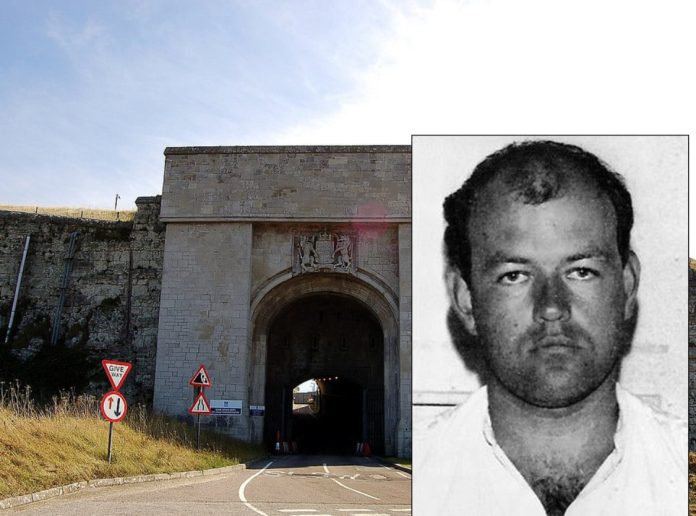Colin Pitchfork’s name is etched into British criminal history as one of the most depraved and calculating killers the country has ever seen. His crimes, committed in the quiet villages of Leicestershire during the 1980s, were so brutal and shocking that they not only devastated families but also changed the course of forensic science. Now, at 65 years old, Pitchfork has been moved to HMP The Verne, a Category C prison in Portland, Dorset, which houses sex offenders. This transfer comes after a turbulent few years that saw him briefly released, only to be swiftly recalled to prison when his behaviour raised alarm bells. The mere mention of his name still invokes fury and grief, particularly for the families of his two young victims, whose lives were stolen in the most horrific way imaginable.
The story of Colin Pitchfork’s reign of terror began in November 1983, when 15-year-old Lynda Mann left her home in the small village of Narborough to visit a friend. She never returned. Her body was discovered the next morning on a deserted footpath known as Black Pad, a shortcut she often took. She had been raped, brutally assaulted, and strangled. The murder sent shockwaves through the close-knit community, with parents gripped by fear and police under immense pressure to find the killer. Despite an extensive investigation, the case went cold, leaving Lynda’s family in agonising limbo.
Three years later, in July 1986, history repeated itself in the most horrifying way. Dawn Ashworth, another 15-year-old schoolgirl from the nearby village of Enderby, vanished while walking home. Her body was found in a wooded area, and the similarities to Lynda’s murder were unmistakable; she too had been raped and strangled. The realisation that a serial predator was at large plunged Leicestershire into panic. Parents refused to let their children walk alone, and police launched one of the biggest manhunts in British history.
What followed was a groundbreaking moment in criminal justice. Dr Alec Jeffreys, a geneticist at the University of Leicester, had recently developed DNA fingerprinting, a revolutionary technique that could identify individuals from biological samples. Police conducted an unprecedented mass screening of local men, collecting blood samples in the hope of finding a match to the killer’s DNA. For months, the investigation dragged on with no success, until a chance encounter changed everything.
A man named Ian Kelly, who worked in a bakery with Pitchfork, was overheard in a pub bragging that he had given a blood sample on Pitchfork’s behalf. This shocking admission led police directly to Pitchfork, who was arrested in September 1987. When confronted with the irrefutable DNA evidence, he confessed to both murders, revealing chilling details about his attacks. In January 1988, he was sentenced to life imprisonment with a minimum term of 30 years, later reduced to 28 on appeal.
For decades, Pitchfork remained behind bars, his name synonymous with the idea of wickedness. Yet in a decision that sparked national outrage, the Parole Board approved his release in September 2021, ruling that he no longer posed a significant risk to the public. The backlash was immediate. The families of Lynda and Dawn condemned the move, arguing that a man capable of such sadistic crimes could never truly be reformed. Their worst fears seemed confirmed when, just two months after his release, Pitchfork was recalled to prison for approaching young women in the street; a clear violation of his licence conditions.
His return to custody raised serious questions about the parole system’s ability to assess dangerous offenders. How could someone who had committed such atrocities ever be deemed safe? The Ministry of Justice defended its processes, but public trust was deeply shaken. Now, Pitchfork has been moved to HMP The Verne, a prison that specialises in housing sex offenders. The facility, a former military fortress on the Isle of Portland, is considered secure enough to manage high-risk inmates while preparing them for potential reintegration; though in Pitchfork’s case, many argue that reintegration should never be an option.
The victims’ families have spent decades living with the aftermath of Pitchfork’s crimes. Lynda Mann’s sister, Rebecca Eastwood, has been a vocal campaigner against his release, stating that “life should mean life” for such monstrous acts. Dawn Ashworth’s mother, Barbara, who passed away in 2020, spent her life fighting for justice, forever haunted by the loss of her daughter. The pain inflicted by Pitchfork is immeasurable, and his brief taste of freedom reopened wounds that will never fully heal.
Beyond the personal devastation, Pitchfork’s case had a lasting impact on criminal investigations worldwide. The use of DNA evidence to secure his conviction marked a turning point in forensic science, leading to the exoneration of innocent suspects and the capture of countless other criminals. Yet while his crimes advanced justice in one sense, they also exposed the flaws in a system that could ever consider releasing a man like him.
As Pitchfork sits in his cell at The Verne, the debate over his future continues. Should he ever be given another chance at freedom? Or should the sheer brutality of his crimes guarantee that he dies behind bars? For the families of Lynda and Dawn, the answer is clear. They have endured decades of grief, and the thought of Pitchfork walking free again is an unbearable betrayal.
One thing remains certain: Colin Pitchfork’s crimes reshaped forensic policing, shattered communities, and left scars that time cannot erase. As long as he lives, the shadow of what he did will loom large, and the fight to keep him locked away will never truly end.







